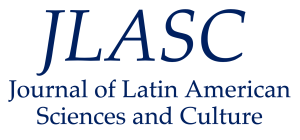Cambio climático y desigualdades; la necesidad de reanalizar las crisis desde la ecología-mundo
DOI:
https://doi.org/10.52428/27888991.v3i4.187Palabras clave:
Cambio climático, Desigualdades, Dominación colonial, Ecología-mundo capitalistaResumen
Las crisis climática y ecológica son, sin duda, de los más graves desafíos de nuestra época. Sin embargo, no están desacopladas de las crisis sociales, económicas y sanitaria que enfrentamos actualmente. La separación de aspectos sociales y ecológicos que es un reflejo del dualismo cartesiano es reduccionista y limitante. Por ello es necesario reanalizar problemáticas actuales y urgentes como el cambio climático desde nuevos marcos conceptuales integrales e interdisciplinarios como la ecología-mundo. El cambio climático se origina con la Revolución Industrial y se asocia a todo el sistema de explotación socio-ecológico que consolidan la actual ecología-mundo capitalista. Las emisiones GEI históricas y actuales muestran una gran desproporción entre países del centro y la periferia, y develan rastros de la dominación colonial. El cambio climático, es una de las crisis originadas y acopladas a la ecología-mundo imperante, y por tanto vinculada a las desigualdades, a la dominación centro-periferia y a la acumulación de capital.
Descargas
Citas
Abbas, Mehdi. (2012). Mondialisation, libre-échange et changements climatiques : vers un conflit de paradigmes?. Mobilités internationales, déséquilibres et développement: vers un développement durable et une mondialisation décarbonée? 28es journées du développement. ATM, Orléans, France. halshs-00711103.
Álvarez, A. (2014). El cambio climático y la producción animal. Revista Cubana de Ciencia Agrícola, 48(1), 7-10.
Davis, S. J., & Caldeira, K. (2010). Consumption-based accounting of CO2 emissions. Proceedings of the National Academy of Sciences, 107(12), 5687-5692.
Ferdinand, M. (2019). Une Écologie Décolonial ; penser l’écologie depuis le monde carïbéen. Éditions du Seuil. ISBN 978-2-02-138850-3.
Fink, M., & Gauthier, C. (2013). Les émissions importées. Le passager clandestin du commerce mondial, Montreuil, Réseau Action Climat-France.
Innerarity, D. (2012). Justicia climática. Dilemata, (9), 175-191.
Moore, J. (2014). De objeto a oikeios: la construcción del ambiente en la ecología-mundo capitalista. Revista Sociedad y Cultura, 2, 87-107.
Moore, J. (2015). Capitalism in the Web of Life: Ecology and the Accumulation of Capital. Verso Books.
Moore, J.W. (2017): “The Capitalocene Part II: accumulation by appropriation and the centrality of unpaid work/energy”, The Journal of Peasant Studies, 45(2), 237-279.
Stern, N. (2006). Stern Review on the Economics of Climate Change. Disponible en: www.sternreview.org.uk
Valencia Giraldo, A. (2001). El gran músculo mecánico: la máquina de vapor. Revista Facultad de Ingeniería, 23, 120-139.
Wallerstein, I. (2004): “The Modern World-System as a Capitalist World-Economy: Production, Surplus Value, and Polarization”. En: World-Systems Analysis. An Introduction, Durham, Duke University Press, 23-41.
Wedekind, J., Milanez, F., & Puig, J. M. (2017). Entrevista a Jason Moore: Del Capitaloceno a una nueva política ontológica. Ecología política, 53, 108-110.
Descargas
Publicado
Cómo citar
Número
Sección
Licencia
Derechos de autor 2021 Journal of Latin American Sciences and Culture

Esta obra está bajo una licencia internacional Creative Commons Atribución 4.0.
Authors who publish in this journal agree to the following conditions: Authors retain copyright and grant the journal the right of first publication, with the work licensed under a Creative Commons Attribution 4.0 International License, which allows others to use the published work provided they acknowledge the authorship and initial publication in this journal. Authors may enter into separate, additional contractual agreements for the non-exclusive distribution of the version of the article published in this journal (e.g., posting it to an institutional repository or publishing it in a book), provided they clearly indicate that the work was first published in this journal. Authors are permitted and encouraged to share their work online (e.g., in institutional repositories or on personal websites) before and during the manuscript submission process, as this can lead to productive exchanges and increased and faster citation of the published work.









